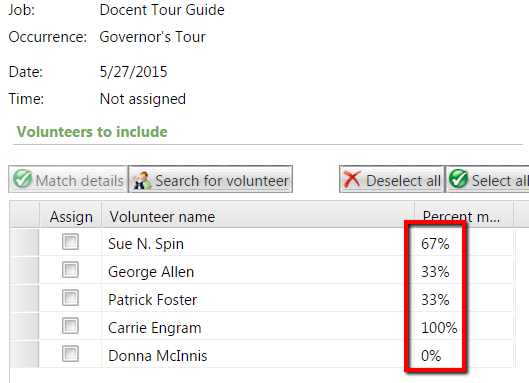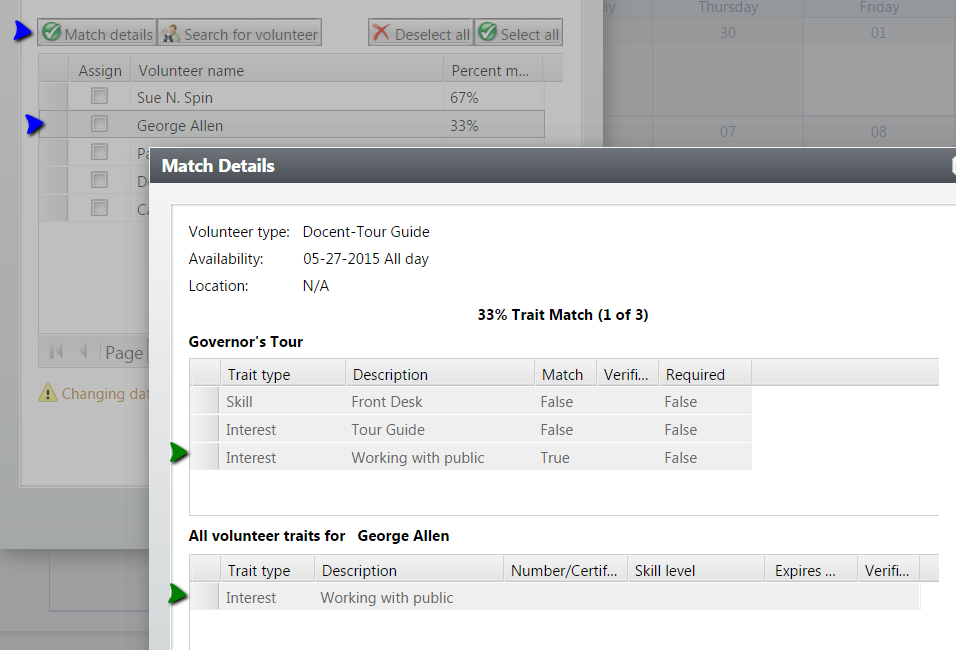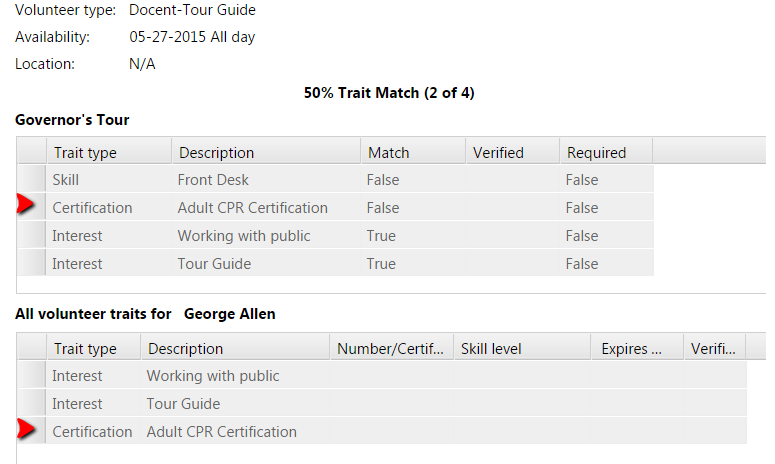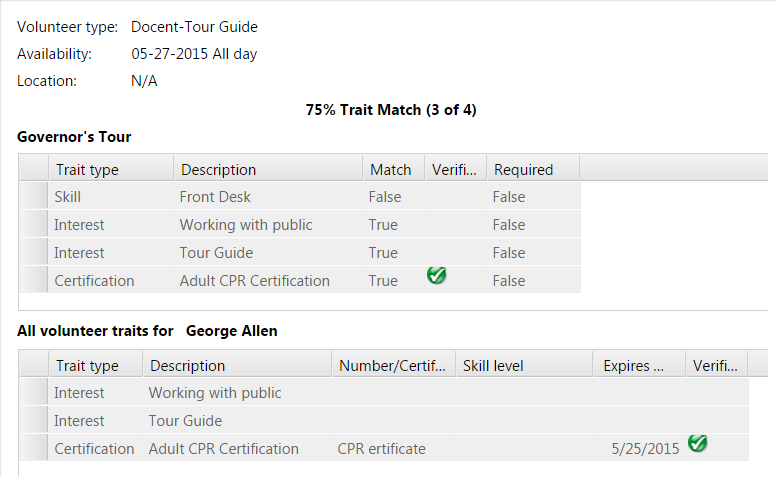Volunteers in Altru Part 3: Bringing Harmony to Volunteer Assignments – Matching Volunteers to Jobs
Published
This is the third installment in a month long series of blog posts all related to Volunteer Management in Altru. Check out Part 1 and Part 2 if you missed them.
In the previous installment of this volunteer series we reviewed options on how to leverage time availability to quickly identify which volunteers are available for assignments. In our blog post this week we are going to dive in a little bit deeper and see how we can use Altru to match up the most suitable volunteers for particular assignments.
Refining the match function between jobs and volunteers can be particularly useful if you have a variety of volunteer jobs that are essentially very similar but have some important differences. Let us take docent tour guides for example. We may have some docents that enjoy schools kids – while others may prefer just adult groups. I am sure you have a select group of experienced docents that are your “go to” for VIP tours.
Let us review some of the parameters that determine which volunteers qualify for a job:
Availability
As mentioned in our previous blog post, if the volunteer has availability restrictions, Altru will use those to identify if the volunteer qualifies as a match for this job occurrence. No mention of availability means the volunteer is available for any time slot.
Location
This is another parameter to determine prequalification. If a location is mentioned for the job occurrence, Altru will select those volunteer records that have a matching location mention. No mention of a location on the volunteer record means the volunteer is eligible for any location and vice versa, if the job occurrence does not have a location assigned means volunteers for any location are eligible for this job.
Volunteer Type
If the job has a volunteer type associated with the job than volunteers need that volunteer type in an active status assigned to their profile in order to qualify for the job. If the status is set to pending (for example, their status may be set to pending because they have not yet completed a specified screening plan) they still would not be eligible for the assignment. If the job does not have a volunteer type defined than any volunteers of any type qualify for the job.
We can connect a volunteer job to only one volunteer type while a volunteer can be associated with multiple types. So in the context of the assignment, volunteer type is essentially a “Go/No Go” filter. By associating a volunteer with multiple types, we pre-qualify the volunteer for various specific volunteer jobs.
Creating a Match through Traits
Volunteer traits are characteristics volunteers need to complete a job. The trait may be required or optional. If the job has the trait set as required, than volunteers need to have that trait present on their record to qualify for the assignment.
As both jobs and volunteers can have multiple trait assigned, Altru reviews the traits between a volunteer and the job and delivers a match percentage as per sample below:
 This percentage value is a rounded value based on the number of matched traits divided by total number of traits associated with the job. In the example above, Carrie Engram is a 100% match because she has all the traits that are associated with the job. At the other end of the spectrum Donna McInnis is at 0% because she has the volunteer type connected with the assignment, but does not have any of the traits assigned for the job. Please note that if the job in this example had a required trait, Donna would need that trait to qualify for this occurrence. Sue Spin is 67% because she has two of the traits for this job, while George and Patrick are at 33% because they only have one trait the matches up.
This percentage value is a rounded value based on the number of matched traits divided by total number of traits associated with the job. In the example above, Carrie Engram is a 100% match because she has all the traits that are associated with the job. At the other end of the spectrum Donna McInnis is at 0% because she has the volunteer type connected with the assignment, but does not have any of the traits assigned for the job. Please note that if the job in this example had a required trait, Donna would need that trait to qualify for this occurrence. Sue Spin is 67% because she has two of the traits for this job, while George and Patrick are at 33% because they only have one trait the matches up.
The neat part is that you can drill down to see which features match up by clicking on a volunteer's name and then clicking Match Details:
 This way you can compare and identify which parameters may be more relevant and help choose between two volunteers that are at the same percentage match.
This way you can compare and identify which parameters may be more relevant and help choose between two volunteers that are at the same percentage match.
There are some traits that have slightly different rules when it comes to evaluating match percentage.
Traits – Verification
If the trait has a verification option, than Altru requires the trait be verified on the volunteer record for it to positively influence the match percentage. For example in the screenshot below you can see that as the certification has not been verified, the match is set to a “False” status.
 If we verify the status of the certification, we can see how the display confirms this status and also bumps up the match percentage:
If we verify the status of the certification, we can see how the display confirms this status and also bumps up the match percentage:
 The following traits have a verification setting: Administrative, Certificate, Course, License and Medical. Please ensure that you have a process in place to confirm if a volunteer has been verified as necessary to appropriately assist with assignment matching.
The following traits have a verification setting: Administrative, Certificate, Course, License and Medical. Please ensure that you have a process in place to confirm if a volunteer has been verified as necessary to appropriately assist with assignment matching.
Traits - Volunteer Special Needs
It is understandable that some volunteers may have special needs such as a mobility or lifting restriction. To qualify a volunteer for a job, Altru confirms that job also has the same special need trait assignment. This is a very useful feature to ensure that we do not approach volunteers with a volunteering opportunity which they unfortunately may not be able to assist.
Traits – Skill Level
Adding a skill trait to a job or volunteer requires one to assign a skill level. Altru requires the volunteer to have a skill level that is the same or higher to qualify for the job. This feature is useful for jobs (typically public facing) where you prefer to have volunteers to have a higher level of skill.
As you can see the volunteer module is a flexible system that delivers harmony on both fronts: it helps you efficiently identify volunteers that match job requirements and also keeps volunteers satisfied with assignments that match up with their skill set and preferences, letting you deliver an enjoyable experience for all.
In the previous installment of this volunteer series we reviewed options on how to leverage time availability to quickly identify which volunteers are available for assignments. In our blog post this week we are going to dive in a little bit deeper and see how we can use Altru to match up the most suitable volunteers for particular assignments.
Refining the match function between jobs and volunteers can be particularly useful if you have a variety of volunteer jobs that are essentially very similar but have some important differences. Let us take docent tour guides for example. We may have some docents that enjoy schools kids – while others may prefer just adult groups. I am sure you have a select group of experienced docents that are your “go to” for VIP tours.
Let us review some of the parameters that determine which volunteers qualify for a job:
Availability
As mentioned in our previous blog post, if the volunteer has availability restrictions, Altru will use those to identify if the volunteer qualifies as a match for this job occurrence. No mention of availability means the volunteer is available for any time slot.
Location
This is another parameter to determine prequalification. If a location is mentioned for the job occurrence, Altru will select those volunteer records that have a matching location mention. No mention of a location on the volunteer record means the volunteer is eligible for any location and vice versa, if the job occurrence does not have a location assigned means volunteers for any location are eligible for this job.
Volunteer Type
If the job has a volunteer type associated with the job than volunteers need that volunteer type in an active status assigned to their profile in order to qualify for the job. If the status is set to pending (for example, their status may be set to pending because they have not yet completed a specified screening plan) they still would not be eligible for the assignment. If the job does not have a volunteer type defined than any volunteers of any type qualify for the job.
We can connect a volunteer job to only one volunteer type while a volunteer can be associated with multiple types. So in the context of the assignment, volunteer type is essentially a “Go/No Go” filter. By associating a volunteer with multiple types, we pre-qualify the volunteer for various specific volunteer jobs.
Creating a Match through Traits
Volunteer traits are characteristics volunteers need to complete a job. The trait may be required or optional. If the job has the trait set as required, than volunteers need to have that trait present on their record to qualify for the assignment.
As both jobs and volunteers can have multiple trait assigned, Altru reviews the traits between a volunteer and the job and delivers a match percentage as per sample below:
 This percentage value is a rounded value based on the number of matched traits divided by total number of traits associated with the job. In the example above, Carrie Engram is a 100% match because she has all the traits that are associated with the job. At the other end of the spectrum Donna McInnis is at 0% because she has the volunteer type connected with the assignment, but does not have any of the traits assigned for the job. Please note that if the job in this example had a required trait, Donna would need that trait to qualify for this occurrence. Sue Spin is 67% because she has two of the traits for this job, while George and Patrick are at 33% because they only have one trait the matches up.
This percentage value is a rounded value based on the number of matched traits divided by total number of traits associated with the job. In the example above, Carrie Engram is a 100% match because she has all the traits that are associated with the job. At the other end of the spectrum Donna McInnis is at 0% because she has the volunteer type connected with the assignment, but does not have any of the traits assigned for the job. Please note that if the job in this example had a required trait, Donna would need that trait to qualify for this occurrence. Sue Spin is 67% because she has two of the traits for this job, while George and Patrick are at 33% because they only have one trait the matches up.The neat part is that you can drill down to see which features match up by clicking on a volunteer's name and then clicking Match Details:
 This way you can compare and identify which parameters may be more relevant and help choose between two volunteers that are at the same percentage match.
This way you can compare and identify which parameters may be more relevant and help choose between two volunteers that are at the same percentage match.There are some traits that have slightly different rules when it comes to evaluating match percentage.
Traits – Verification
If the trait has a verification option, than Altru requires the trait be verified on the volunteer record for it to positively influence the match percentage. For example in the screenshot below you can see that as the certification has not been verified, the match is set to a “False” status.
 If we verify the status of the certification, we can see how the display confirms this status and also bumps up the match percentage:
If we verify the status of the certification, we can see how the display confirms this status and also bumps up the match percentage: The following traits have a verification setting: Administrative, Certificate, Course, License and Medical. Please ensure that you have a process in place to confirm if a volunteer has been verified as necessary to appropriately assist with assignment matching.
The following traits have a verification setting: Administrative, Certificate, Course, License and Medical. Please ensure that you have a process in place to confirm if a volunteer has been verified as necessary to appropriately assist with assignment matching.Traits - Volunteer Special Needs
It is understandable that some volunteers may have special needs such as a mobility or lifting restriction. To qualify a volunteer for a job, Altru confirms that job also has the same special need trait assignment. This is a very useful feature to ensure that we do not approach volunteers with a volunteering opportunity which they unfortunately may not be able to assist.
Traits – Skill Level
Adding a skill trait to a job or volunteer requires one to assign a skill level. Altru requires the volunteer to have a skill level that is the same or higher to qualify for the job. This feature is useful for jobs (typically public facing) where you prefer to have volunteers to have a higher level of skill.
As you can see the volunteer module is a flexible system that delivers harmony on both fronts: it helps you efficiently identify volunteers that match job requirements and also keeps volunteers satisfied with assignments that match up with their skill set and preferences, letting you deliver an enjoyable experience for all.
News
ARCHIVED | Blackbaud Altru® Tips and Tricks
05/26/2015 3:00pm EDT

Leave a Comment